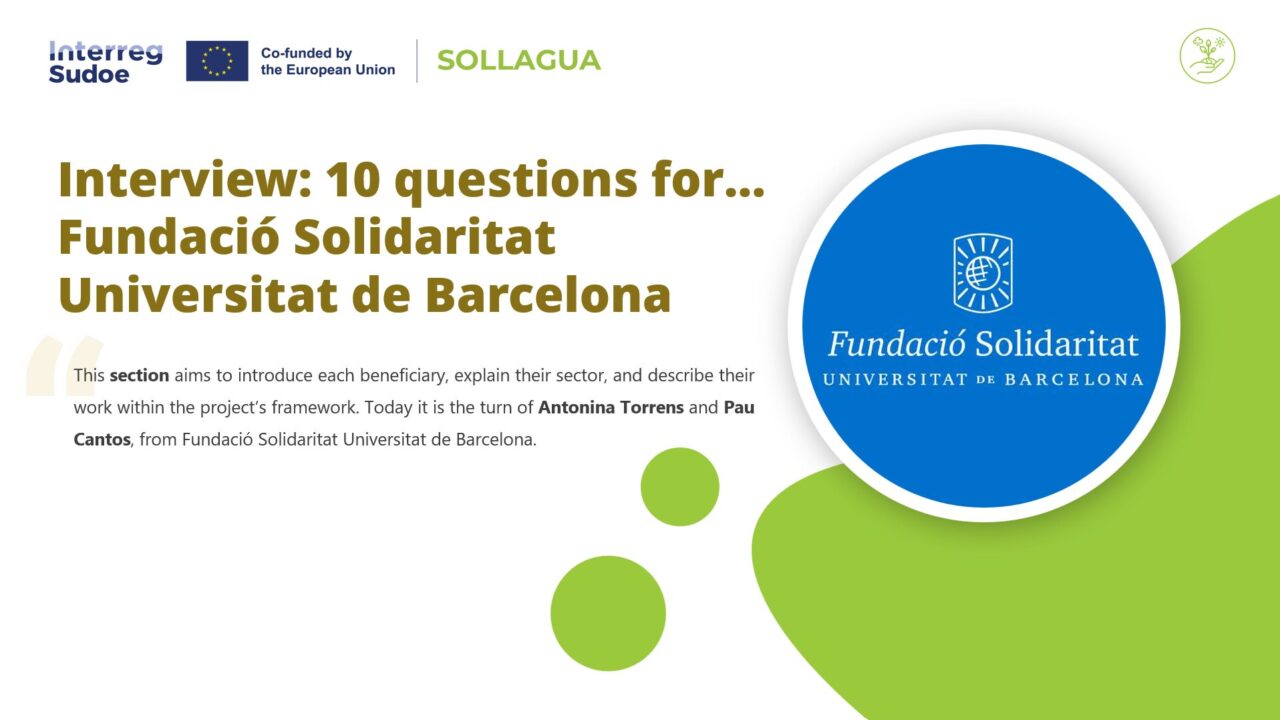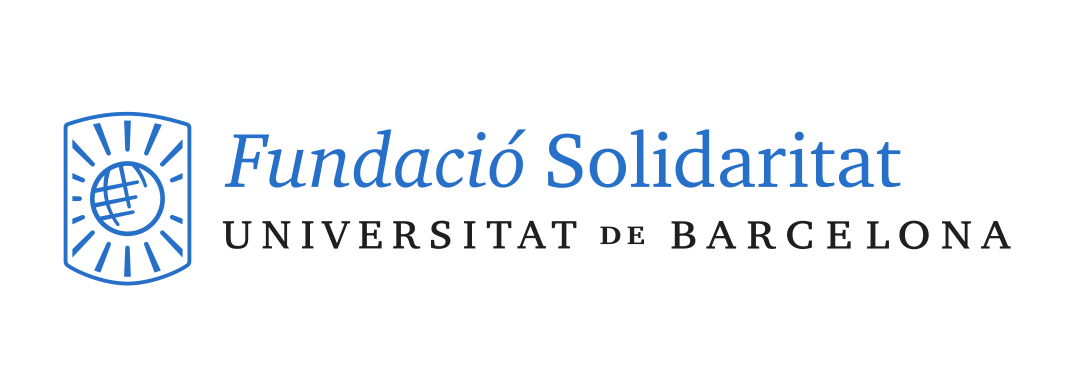This section aims to introduce each beneficiary, explain their sector, and describe their work within the project’s framework. Today it is the turn of Antonina Torrens and Pau Cantos, from Fundació Solidaritat Universitat de Barcelona (FSUB).
What is Fundació Solidaritat Universitat de Barcelona (FSUB)?
The Fundació Solidaritat Universitat de Barcelona (UB Solidarity Foundation) is the social responsibility arm of the University of Barcelona. Since 1996, it has been turning academic knowledge into real solutions for today’s global challenges.
Beyond supporting refugees, defending human rights, and promoting inclusive education, the Foundation is also deeply engaged in sustainability and climate action. It develops projects on water management, biodiversity, and nature-based solutions, helping communities adapt to climate change while protecting ecosystems. From urban agriculture initiatives to collaborative research on renewable energy and sustainable cities, the Fundació Solidaritat UB bridges science, policy, and society.
Its work connects the local and the global: engaging students in volunteering and social innovation in Barcelona, while also partnering with universities and organizations worldwide to advance the UN Sustainable Development Goals.
In short, the Fundació Solidaritat UB is where the university meets the world — mobilizing knowledge, solidarity, and innovation to build a fairer and more sustainable future.
How long have you been working at Fundació Solidaritat UB and what is your background and role in the institution?
Antonina Torrens: I began collaborating with the Fundació Solidaritat UB in 2005, while carrying out my doctoral research through a project in Morocco. Since then, I have taken part in numerous international cooperation initiatives in countries such as Vietnam, Morocco, Senegal, Palestine, Laos and Cambodia, mainly focused on Nature-Based Solutions and on wastewater treatment and reuse. In parallel, I have continued my academic career at the University of Barcelona, within the Department of Biology, Health and Environment, where I teach and conduct research in environmental sanitation. At the Fundació Solidaritat UB, I am currently responsible for the Nature-Based Solutions for Sustainable Development programme, which connects academic knowledge with practical solutions for communities facing environmental and social challenges.
Pau Cantos: I have been working at the Fundació Solidaritat UB for more than ten years. With a background in political science, I manage cooperation and global justice education projects. One of my responsibilities is to support local public administrations in developing content on development cooperation.
At present, we are working as a tandem on several projects related to sustainability, both within the European framework and at the international level.
What do you like about your work?
Working in a multidisciplinary environment like the Fundació Solidaritat UB, where such diverse areas as democratic memory, refuge and asylum, environmental sustainability, gender, and global justice education intersect, is extremely enriching. Although our work is organized into programs, the constant contact and collaboration across different areas bring continuous personal and professional growth.
A key motivation is the chance to apply innovative solutions that improve environmental management while strengthening cooperation between universities and development actors. This approach enhances the social impact of research, ensuring that knowledge is translated into tangible benefits for communities. It also demonstrates how academic expertise can contribute directly to both sustainability and social transformation.
The international dimension of our work allows us to get to know other realities and ways of working, opening perspectives that generate both challenges and learnings we can apply. Building and taking part in networks also gives us the opportunity to meet people and institutions with whom we later develop joint projects — such as our participation in SOLLAGUA.
Is this your first EU project?
The Fundació Solidaritat UB has long experience in European projects, having participated in Erasmus+ initiatives, Capacity Building in Higher Education programs, and even research frameworks such as H2020. However, this is indeed our first participation in an Interreg project, which we find particularly enriching. Interreg’s distinctive strength lies in its strong territorial focus, bringing together a wide range of stakeholders — from universities and research centers to local authorities, NGOs, and communities — to co-design and apply practical solutions.
For us, this format is especially attractive because it reinforces the connection between academic knowledge and its direct application in real contexts, while promoting cross-border collaboration.
Another key reason we value international projects is the possibility of identifying common challenges and barriers that affect universities — in our case — but also civil society at large. Bringing together different actors with diverse perspectives to address shared problems enriches our work and strengthens our ability to respond.
What is the appeal of SOLLAGUA to the Fundació Solidaritat UB?
As experts in Nature-Based Solutions, SOLLAGUA represents a unique opportunity to scale up our interventions at the European level and apply them in real contexts that directly benefit civil society, contributing modestly to improving services linked to water reuse.
Engaging with public administrations — both local and supranational — from neighboring countries such as France and Portugal, and analyzing differences in legislation and opportunities to adapt and apply the proposed solutions, has been particularly stimulating. This was especially relevant given the legislative changes that occurred during the review process. These dynamics of working in a living ecosystem enrich our knowledge and help us stay up to date.
What is the Fundació Solidaritat UB’s mission in the SOLLAGUA project?
The mission of the Fundació Solidaritat UB in the SOLLAGUA project is to apply its long-standing expertise in water reuse, environmental law, and nature-based solutions to foster sustainable water management in rural areas. FSUB plays a central role in the design and evaluation of demonstration sites where innovative, nature-inspired systems treat and recycle wastewater, ensuring both technical performance and ecological balance.
Together with the University of Barcelona, it monitors water quality and the health of surrounding ecosystems, while also drawing on its experience in previous Living Labs to guide replication and adaptation in new contexts. Beyond the technical work, FSUB is deeply engaged in spreading knowledge and promoting the adoption of these strategies among universities, public authorities, companies, and end-users.
In essence, its mission is to bridge science, regulation, and society so that water reuse through nature-based solutions becomes not only viable but a shared pathway towards climate resilience and sustainability across the SUDOE region.
Currently, what are you engaged in?
Our first task was to develop the State of the Art, which has already been published. Thanks to the support of our partners, we believe it is a very solid document. The State of the Art is a review of current technologies for wastewater reclamation. While it initially focuses on Nature-Based Solutions (NBS), it also expands to include “grey” technologies and hybrid systems. The goal is to identify effective and innovative technologies for water reuse, highlight trends, pinpoint gaps, and explore potential future directions. As a technical resource for the SOLLAGUA project, it provides key insights for selecting reuse technologies and developing strategies for different scenarios.
This document has also supported the creation of the project’s problem tree, in which we were actively involved. At this stage, we are beginning to work on the educational component for project beneficiaries, which we consider highly relevant. For us, this is a cornerstone of SOLLAGUA, as it ensures that research outputs are transferred into real-world practice and reach final users — from policymakers to end users.
What are the main challenges you are currently facing?
One of the main challenges we face is the complexity of adapting Nature-Based Solutions to very different rural contexts while ensuring compliance with diverse legal frameworks in Spain, France, and Portugal. Balancing technical innovation with regulatory requirements is not always straightforward, especially in a field like water reuse where legislation is evolving rapidly. Another challenge is ensuring that local stakeholders — from farmers to municipalities — feel confident in adopting these new systems. Building trust takes time, and it requires not only scientific evidence but also strong communication and participatory processes.
What are the key findings to date?
So far, one of the key findings is that Nature-Based Solutions are not only technically effective but also socially acceptable when communities are engaged from the beginning. The deliverable «Portfolio of different treatment schemes for water reuse» we developed has shown the wide potential of combining green, grey, and hybrid technologies, highlighting that fit-for-purpose approaches are essential: the right level of treatment depends on the real needs of each context.
We have also confirmed that transnational collaboration adds great value: sharing experiences across the SUDOE region reveals common challenges but also innovative practices that can inspire replication elsewhere.
What do you think SOLLAGUA’s contribution will be after the end of the project in scientific, social and economic terms?
Once completed, SOLLAGUA will leave behind a threefold contribution. Scientifically, it will provide new evidence and practical models on how nature-based solutions can treat and reuse water efficiently in rural areas, generating knowledge that strengthens European leadership in sustainable water management. Socially, the project will empower local communities, farmers, and public authorities with accessible tools and demonstration sites that show water reuse is safe, inclusive, and beneficial for ecosystems, while also building trust through citizen engagement. Economically, SOLLAGUA will prove that water reuse with low-cost, low-energy technologies is not only feasible but competitive, opening the door to greener public procurement and new opportunities for SMEs and local actors.
In short, its legacy will be to transform water scarcity from a pressing challenge into a driver of innovation, resilience, and shared prosperity across the SUDOE region!
Follow us!
➡️@SOLLAGUAproject
➡️SOLLAGUA – Interreg Sudoe
➡️@SOLLAGUA-InterregSUDOE
➡️SOLLAGUA Newsletter


